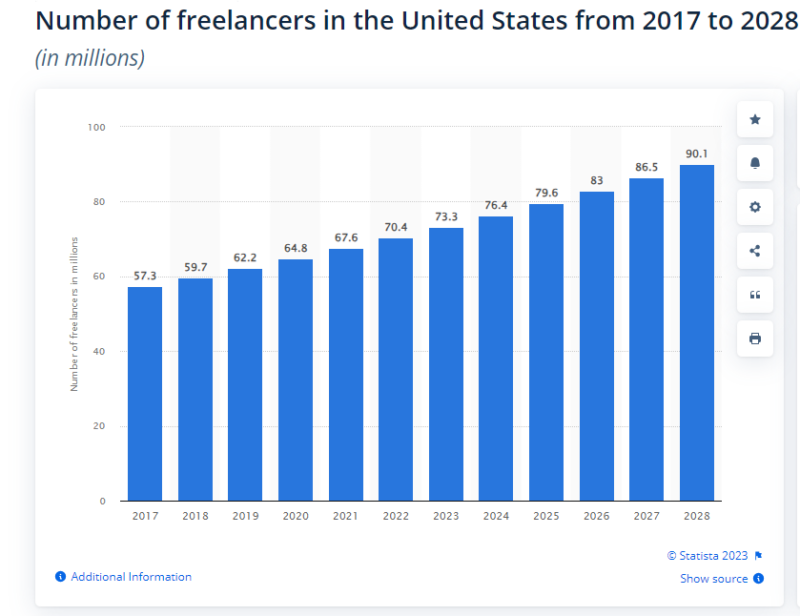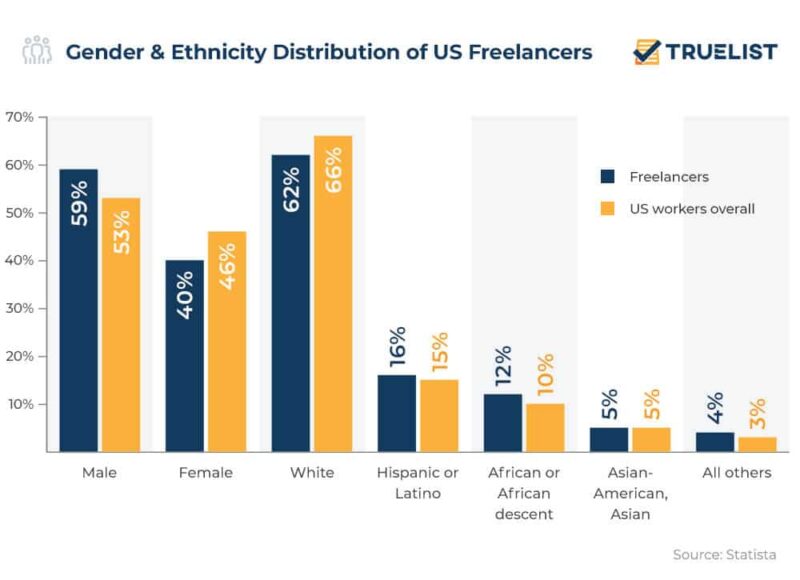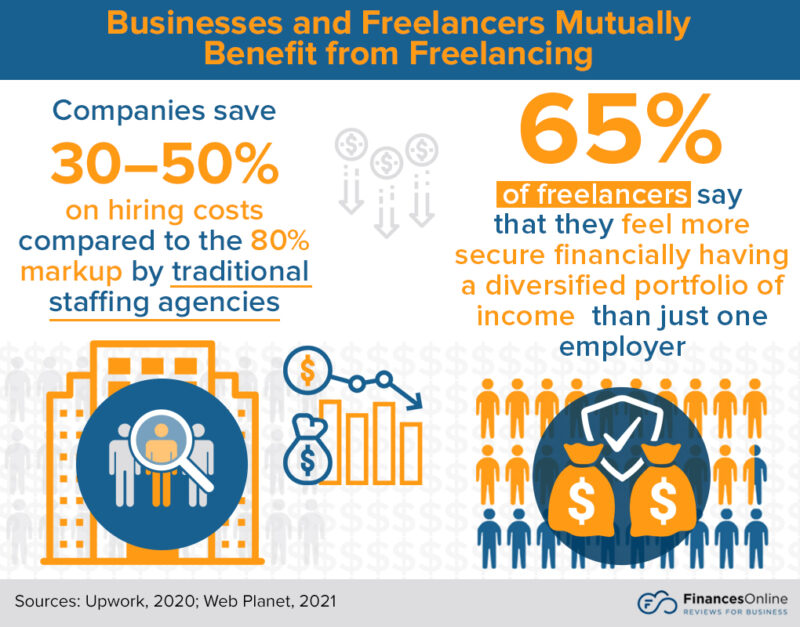The global workforce landscape is undergoing a significant transformation, fueled by the rapid rise of freelancing – a phenomenon that is reshaping the traditional boundaries of outsourcing operations, such as the realm of social media marketing, sales, and IT. As the gig economy grows in popularity, an increasing number of professionals are embracing the freedom and flexibility of freelancing, resulting in a paradigm shift in how companies outsource talent and manage resources. This seismic shift opens new opportunities for professionals seeking career autonomy and prompts organizations to re-evaluate their approaches to project management, cost-effectiveness, and developing dynamic, virtual collaborations.
This article delves into the impacts of the freelancer boom, dissecting its influence on traditional outsourcing and uncovering the innovative ways businesses adapt to this in pursuit of greater agility and efficiency.
The Rise of Freelancers
The boom in freelance work, characterized by individuals offering outsourcing services and skills on a project-by-project basis, has reshaped traditional employment paradigms, opening up a world of opportunities for professionals and businesses. According to the report published by Statista, it is projected that in 2027, 86.5 million people will be freelancing in the United States, making up 50.9 percent of the total U.S. workforce.


Factors Contributing to the Surge of Freelancers
Advancements in Technology
The rapid technological improvements are a major reason for the rise in freelancers. Traditional barriers to entry have been reduced as technology has improved, allowing individuals to leverage their skills independently. Because of the growing use of digital platforms and virtual collaboration tools, as well as the democratization of information, has produced an environment suited to freelance work.
Changing Work Preferences
Individual’s preferences for flexibility, autonomy, and a diverse work portfolio are becoming more and more prevalent as societal attitudes on work undergo a transformative shift. This shift in perspective is causing professionals to move away from traditional employment structures and toward freelance work. Freelancers are becoming more popular due to the need for a more customized and flexible work environment. This reflects a larger societal trend that values autonomy and a break from the traditional 9-5 workweek.
Global Connectivity
The smooth global connectivity of individuals has drastically demolished geographical barriers and changed the nature of work. These days, freelancers can work with employers and clients anywhere in the world, which increases their opportunities. The rise of freelancing has been fueled by the increased global connectivity brought by digital communication tools and online platforms. This has allowed individuals to break free from the limitations of traditional employment and adopt a more flexible and globally oriented-work style.
Impact on Traditional Outsourcing Models
In contrast to traditional outsourcing, which assigns entire projects or tasks to external outsourcing companies, freelancing offers a more individualized and agile approach. Compared to the larger, more structured approach of traditional outsourcing, freelancers offer specialized skills on a smaller scale, allowing for greater flexibility and personalized interactions. With more customization, faster turnaround times, and access to a larger talent pool, this shift towards freelancing has completely changed the outsourcing market. For major projects, the traditional outsourcing approach does, nevertheless, continue to offer stability and comprehensive solutions. The influence on outsourcing models shows a complex trade-off between stability and adaptability as companies assess the benefits of freelancer’s flexibility against the reliability of traditional outsourcing structures.
Advantages and Disadvantages of Each Model
1. Cost-effectiveness: Freelancers offer cost savings, but traditional outsourcing can stabilize long-term collaborations.
2. Flexibility: Traditional outsourcing requires more structured agreements and commitments, limiting adaptability, whereas freelancers offer unparalleled flexibility, allowing outsourcing companies to scale resources based on project needs.
3. Quality of Work: Evaluating work quality becomes critical, with freelancers valued for specialized skills and traditional third-party services for consistency and reliability in delivering standardized outcomes.
4. Communication and Collaboration: Freelancers frequently thrive in dynamic, remote work environments, relying on digital communication technologies for effective collaboration. This promotes direct and personalized communication between clients and freelancers. On the other hand, the traditional outsourced team may require multiple communication levels through project managers and coordinators.
Platforms and Technology Driving the Freelancer Boom
Online Freelancing Platforms
Upwork: A virtual marketplace that connects freelancers and clients, facilitating global project bidding and collaboration.
Fiverr: A virtual environment where freelancers offer services in various areas, catering to a wide range of client needs and boosting independent professionals’ reach.
Freelancer.com: Providing a platform for freelancers to showcase their abilities and clients to find suitable talent, contributing to the growing trend of remote freelance work.
Emerging Technologies Facilitating Remote Work
Emerging technologies have been critical in facilitating remote work and providing solutions that improve collaboration, communication, and overall productivity. Here are some key technologies:
Cloud Computing
1. Infrastructure as a Service (IaaS)
2. Platform as a Service (PaaS)
3. Software as a Service (SaaS)
Project Management Tools
1. Asana
2. Trello
3. Jira
Communication Platforms
1. Zoom
2. Microsoft Teams
3. Slack
Collaboration Suites
1. Google Workspace
2. Microsoft 365
Changing Dynamics in Business Relationships
Collaboration in a virtual environment
Businesses are embracing the digital age by fostering collaboration in virtual settings. Remote work has become the norm, made possible by advanced communication technologies. Companies are connecting with freelancers worldwide using project management tools, cloud computing, and video conferencing platforms. This virtual collaboration eliminates geographical barriers and enables a diversified and global talent pool.
Building and maintaining relationships with freelancers
While traditional outsourcing frequently requires long-term, transactional agreements, companies now see the value of developing continuous relationships with individual freelancers. Companies invest time in understanding freelancers’ skills and strengths, resulting in a more personalized and mutually beneficial collaboration. Building trust and good communication is becoming increasingly important in the freelancer-client relationship.
Shifting from long-term contracts to project-based work
The freelance model is ushering in a transition from rigid, long-term contracts to a more flexible, project-based approach. Companies are dividing huge tasks into manageable projects, allowing them to tap into specialized freelancers for specific business processes. This move allows companies to respond to changing market demands, scale up or down as needed, and access a greater spectrum of expertise for various projects. It also corresponds to the preferences of many freelancers who seek varied and short-term work.
Challenges and Solutions
Embracing the freelance revolution has its own challenges, each presenting an opportunity for innovative solutions that redefine how businesses work in a globalized, virtual environment. As companies shift to collaborative models centered on freelancers, three important challenges emerge: addressing concerns about reliability and accountability, ensuring effective communication, and managing cultural differences.
Addressing concerns about reliability and accountability
Concerns about the reliability and accountability of remote workers are rising as companies increasingly rely on freelancers for core business tasks. Companies implement stringent vetting processes to address these issues, leverage freelance platforms that provide transparent performance metrics, and establish clear expectations through well-defined project scopes. Furthermore, smart contracts and milestone-based payments hold freelancers accountable for delivering results on time.
Ensuring effective communication in a virtual workspace
The virtual workspace introduces new communication issues that can hinder the project’s success. Businesses are investing in powerful communication tools and collaborative platforms to combat this. Regular video conferencing, instant messaging apps, and project management tools provide real-time communication, establishing a sense of connectivity among team members despite geographical distances. Clear communication protocols, regular check-ins, and establishing a centralized repository for project-related information all contribute to effective collaboration.
Managing cultural differences in a global freelancing market
With freelancers contributing worldwide, addressing cultural differences becomes an important component of successful collaboration. Businesses recognize the value of cultural sensitivity training for the in-house team and freelancers. Embracing cultural diversity, encouraging open communication about diverse work styles and expectations, and including flexible work hours to meet different time zones all contribute to fostering an inclusive and harmonious workplace.
Opportunities for Businesses

1. Access to Global Talent Networks: Businesses can tap into a global talent pool to access specialized skills and expertise. This broadens the available talent pool and helps businesses form teams with the specialized capabilities needed for specific projects, improving overall project success.
2. Cost-Effective Solutions: Companies can avoid the fixed costs associated with traditional employment, such as office space, benefits, and training expenses, by employing freelancing talent. This low-cost solution is especially useful for project-based work.
3. Rapid Response to Market Changes: Companies collaborating with freelancers for short-term tasks can adjust quickly to industry shifts and capitalize on emerging opportunities without being bound by long-term employment obligations.
4. Harnessing Specialized Expertise: Businesses can use freelancers strategically to bridge skill gaps, ensuring that projects are completed with precision and expertise. This approach enables companies to undertake complex projects without requiring extensive in-house training.
5. Innovation through Diverse Perspectives: Freelancers’ different backgrounds and experiences can bring new perspectives and innovative ideas to projects. Collaborating with freelancers develops a culture of creativity within the organization, improving problem-solving approaches and fostering innovation.
6. Strategic Portfolio Building: Businesses can strategically build project portfolios by leveraging freelancers. This diverse approach enables them to work on multiple projects simultaneously, optimizing revenue streams and boosting market reach.
The rise of freelancers not only represents a shift in how talent is sourced but also reflects a broader mindset of flexibility, agility, and a redefined approach to collaborative partnerships. With far-reaching effects, this rising trend challenges businesses to embrace innovation, reconsider old norms, and harness the limitless potential of a workforce that thrives on independence, specialization, and adaptability. As the freelancing boom continues, its impact on outsourcing trends and models remains a compelling story, shaping the future contours of work and collaboration.



Leave A Comment
You must be logged in to post a comment.